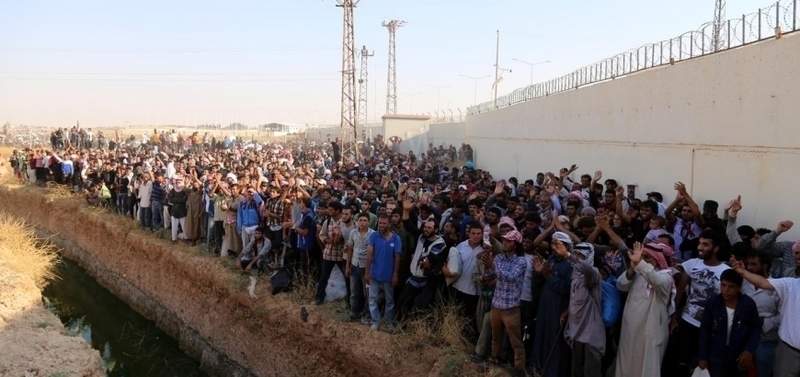The battles accelerated recently between the Islamic State (ISIS) on one hand, and the Kurdish People's Protection Units (YPG) and the Free Syrian Army factions on the other in the countryside of Raqqa.
ISIS has since lost strategic strongholds such as the town of Sulouk in the countryside of the province, as well as a number of villages, while Kurdish forces have now reached the outskirts of the city of Tal Abyad on the Syrian-Turkish border.
Images and video clips broadcast Monday show people gathered in the city of Tal Abyad, standing on the border awaiting entry into Turkey, where most of the population have left their homes fearing the arrival of battle to the heart of the city.
Al-Souria Net spoke to ‘Rami’, a citizen from Tal Abyad and one of those who managed to enter Turkey Monday, after three days of waiting on the border.
Rami explained that the problem of people gathering on the border is not new, as people have been attempting to enter Turkey for 10 days, especially the residents of Sulouk, Ras al-Ayn and Turkman in the countryside of Raqqa. The Turkish side of the border has allocated a new entry for displaced people, located in the eastern side of Tal Abyad, they also opened the border crossing at al-Issawi.
Rami explained: "The Turkish army was taking people to the main crossing in Akcakale, where the names of people were registered and they were provided with food and water, then they were allowed to enter Turkey through these crossings".
"I was able to enter Turkey today. My family and I, in addition to a number of children and women, have spent three days on the border, where the Turkish government refused us entry. They were telling us: ‘Go to your homes, it is not your turn yet’, but the people did not respond, especially since the aircrafts of the international coalition focused on Tal Abyad and the surrounding villages, they even bombed areas near the border where people gathered", Rami added.
Rami reflected the phrase used by the Turkish soldiers, ‘Go back to your homes, it is not your turn yet’, saying: "They meant that we must make room for the people of the other villages where clashes are taking place, such as Sulouk and Ras al-Ayn, and that we should go back to Tal Abyad as it is far from the clashes".
Rami revealed there have been casualties at the border, where an elderly woman died because of overcrowding, and dozens of children have been lost. "One of the displaced were forced to give birth on the borderline", Rami added.
Rami spoke about the clashes in Tal Abyad: "The clashes stopped since yesterday, after Kurdish units arrived in al-Jallab river, which is about three kilometers away from Tal Abyad, but they could not cross the river because ISIS blew the bridge a few days ago. In the eastern front, the coalition's aircraft are combing the areas around the river and there are reports that Kurdish units may build a bridge to be able to move their heavy machinery. On the southern front, the battles have also stopped after ISIS blew another bridge in al-Sheriaat area".
Rami explained that Kurdish forces have only one route to enter the city, through al-Meriraray road.
People's Protection Units and the Free Syrian Army factions, backed by air cover from the international coalition, recently seized the town of Sulouk to the north of the city of Raqqa, considered one of the largest strongholds of ISIS in Syria.
This progress follows a process initiated by the joint forces a week ago against ISIS locations in the villages of al-Wosta, Raiber, Shuraa and Aliah in the countryside of Hassakeh, northeastern Syria.
The United States has also voiced concern about reports revealing that the Kurdish units have used battles to displace large numbers of Arabs and Turkmen Syrians.
Translated and edited by The Syrian Observer


